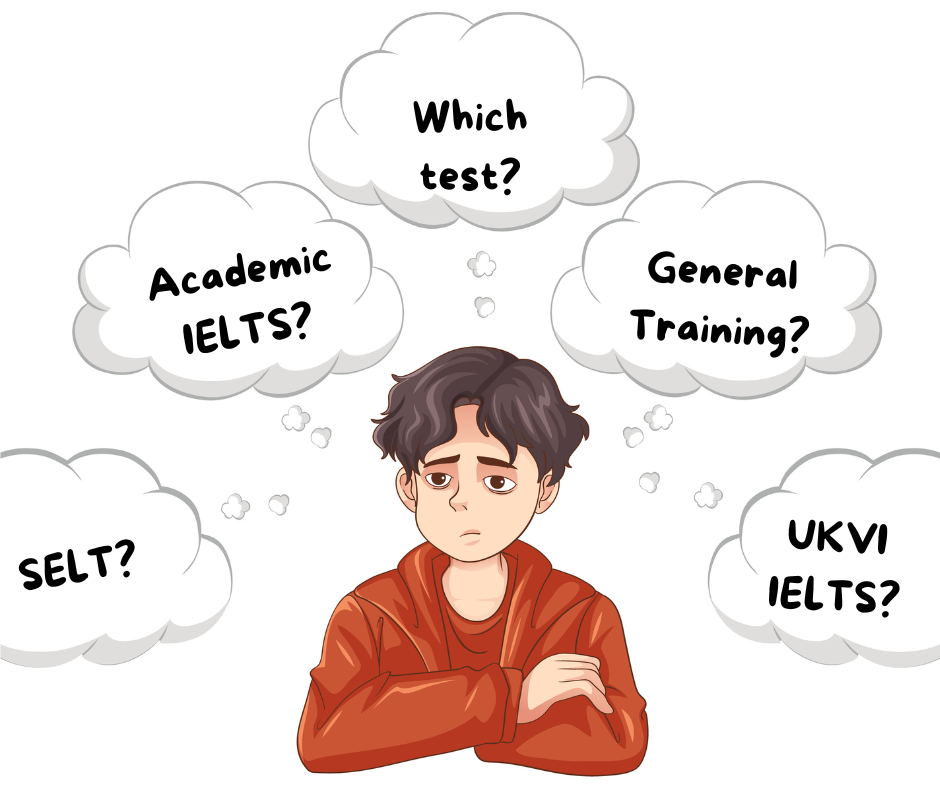So, you’re planning on taking the IELTS test.
That’s great!
But are you sure you know which one you should sit for?
You’re probably already aware that there are a number of IELTS exams from which you can choose. And it’s of utmost importance that you know which exam is for you.
We have come across people who have had to sit for the IELTS (International English Language Testing System) exam twice because they registered for the wrong IELTS exam the first time and, of course, their application got rejected.
So that this does not become your story too, we’ve prepared this blog to guide you in your journey to select the IELTS test that will match your requirements.
Today, we are going to discuss the different types of IELTS exams in detail so that by the end of it, you can confidently say which one you should prepare for.
The Different Types of IELTS Exams
There are four types of IELTS exams that can be grouped into two separate categories. Each one is for a few specific purposes and the tests themselves differ from each other on varying degrees to evaluate certain skills.
The two main types of IELTS exams are:
- Regular IELTS
- Secured English Language Test (SELT)
Now, let’s find out which IELTS is for you.
Regular IELTS
The Regular IELTS can be further broken down into the following:
- IELTS Academic
- IELTS General Training
IELTS Academic

So, let’s start with the test type you are most likely here for if you’re a student, the IELTS Academic test.
This test is for you if you are planning on:
- Studying as an undergraduate student in an English-speaking country
- Studying as a post-graduate student in an English-speaking country
- Starting your career in a professional organization in an English-speaking country
This test is crafted to assess your ability to understand difficult academic text, take part in educational discussions, and share your thoughts in an academic context.
Basically, it evaluates if you’re ready to study in English. So, it uses vocabulary that is common in places of higher education.
Hence, the IELTS Academic test is considered to be harder than the IELTS General Training test.
The test contains four sections:
- Listening
- Reading
- Writing
- Speaking
Each section is carefully designed to test your competence in an academic setting. While the Listening and Speaking sections of the test remain the same for all the different types of IELTS exams, the Reading and Writing sections are slightly different for the Academic version of the test.
You can choose to take the IELTS Academic test on paper or a computer.
IELTS General Training
Now, let’s talk about the IELTS General Training test.
The IELTS General Training and Academic are completely different types of tests and are for two separate objectives. Although you may find that certain organizations may accept one in place of the other, the decision is really in their hands.
So, who is the IELTS General Training test really for?
This test is for you if you are planning to:
- Work in an English-speaking country
- Migrate to an English-speaking country
- Apply to study below degree level in an English-speaking school or college
The IELTS General Training will evaluate your communication skills in practical situations. The test will assess your ability to:
- Follow instructions
- Compose formal letters or emails
- Understand workplace or social situations
- Have conversations with native English speakers
Like the Academic test, the General Training test also has four modules:
- Listening
- Reading
- Writing
- Speaking
This test can also be taken either on paper or a computer.
Secured English Language Test (SELT)
Now let’s move on to SELT (Secured English Language Test). You may or may not have heard of them, but it’s imperative you know what they are and if they are for you.
SELT is also of two types:
- IELTS for UK Visas and Immigration (UKVI)
- IELTS Life Skills
IELTS for UK Visas and Immigration (UKVI)

The IELTS for the United Kingdom Visas and Immigration (UKVI) is for you if you’re from a non-English speaking country and are planning to study or migrate to the UK.
This test is exactly the same as the previous IELTS tests mentioned above in almost every aspect including scoring, content, level of difficulty, and format.
The only difference is that this test adds some extra security protocols to make sure of the legitimacy of the person sitting for the test. Hence, you have to take this test at an approved test center and your test will be validated by the UK Home Office for work, study, and migration purposes.
Furthermore, your TRF (Test Report Form) will appear a little differently than the standard IELTS one.
You also need to be aware of certain things if you’re planning on moving to the UK.
Firstly, you need to take the IELTS for the UKVI test to satisfy the UK immigration’s requirement and cannot use the score of any of the previous IELTS tests mentioned above for the UK Visa application.
Secondly, depending on the organization or institution, you may use your IELTS for UKVI score for other purposes in other countries. Over 10,000 academic and professional organizations throughout the world acknowledge IELTS scores.
IELTS Life Skills
Now, IELTS Life Skills is an exam that you mainly need to sit for to get a UK Visa by proving your ability to take part in everyday conversations.
It is a specialized test that aims to assess your Speaking and Listening skills at the Common European Framework of Reference for Language (CEFR) for levels A1, A2, or B1.
IELTS Life Skills is available at the following levels:
- IELTS Life Skills: A1 Speaking and Listening
- IELTS Life Skills: A2 Speaking and Listening (offered in the UK only)*
- IELTS Life Skills: B1 Speaking and Listening
You have to take the IELTS Life Skills A1 test if you plan on applying under the category of “family of a settled person”.
On the other hand, if you are applying under “indefinite leave to remain” or “citizenship”, you need to sit for the IELTS Life Skills B1 test.
If you fall under the category of a family route migrant and are looking to extend your stay in the UK, you need to sit for the IELTS Life Skills A2 test.
Choose the Right Test
Before you choose the correct IELTS test, you have to consider your goals.
Whether you’re aiming for professional opportunities, higher education, or immigration, there is an IELTS test to match your needs.
Look into your target organization or institution and research their specific requirements. There’s a very good chance that they have the information included on their website.
Whether it’s the IELTS Academic, IELTS General Training, IELTS for UK Visas and Immigration, or IELTS Life Skills, each test serves a distinct purpose and offers a pathway to your preferred destination.
| Test | Modules | Purpose |
| IELTS Academic | Listening Reading Writing Speaking | Pursuing higher degrees Working in particular organizations |
| IELTS General Training | Listening Reading Writing Speaking | Studying below degree level Employment Migration |
| IELTS for UKVI | Listening Reading Writing Speaking | Studying in the UK Migrating to the UK |
| IELTS Life Skills | Listening Speaking | Applying for UK citizenship or “indefinite leave to remain” Extending stay in the UK |
Preparation Is Key
If you’ve read ‘til this point, you now know more about the different kinds of IELTS tests than most people.
And hopefully, you’ve gained enough insights to decide which IELTS test you should take.
By making yourself familiar with the scoring systems, test formats, and purposes of each test, you can successfully plan and prepare for the IELTS test that aligns with your objectives.
Remember, to get a good score on the IELTS test, you need to practice consistently, have dedication, and have a solid grasp of the English language.
So arm yourself with the necessary resources and embark on your journey to acquire the language proficiency needed for your academic, professional, or immigration aspirations.
Good luck!


